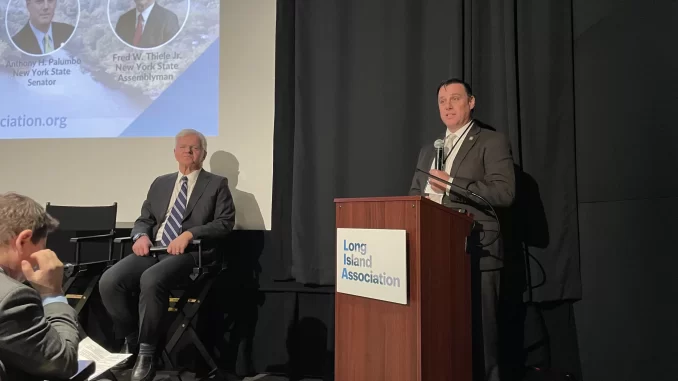
The Long Island Association (LIA) hosted a discussion on January 26 with East End businesses at the Sag Harbor Cinema to discuss the Peconic Bay Community Housing Fund, which was passed by voter referendum in November 2022 in the Towns of East Hampton, Southampton, Southold, and Shelter Island. The featured speakers were New York State Senator Anthony Palumbo (R-New Suffolk) and New York State Assemblyman Fred Thiele (I-Sag Harbor), who sponsored legislation authorizing the state to create the fund.
“There is an overwhelming need for affordable housing on the East End and, using the successful model of the Community Preservation Fund, which resulted in millions to preserve open space, the Peconic Bay Community Housing Fund will allow local municipalities to have more resources to meet the specific housing needs in their Towns,” Thiele said.
“This bill is good government — it will allow our East End towns to retain and attract residents and ensure that businesses have places for their employees to live in our communities,” Palumbo added.
“Housing is an acute issue on the East End, and I commend Senator Palumbo and Assemblyman Thiele for offering the local governments an innovative and flexible way to meet their housing demand and catalyze economic growth,” said LIA President and CEO Matt Cohen.
“Today’s event was a great opportunity for businesses, government, not-for-profit organizations, and labor leaders to learn more about how the Peconic Bay Community Housing Fund will support local businesses,” said Jane Duggan, senior vice president and commercial regional group manager at TD Bank and co-chair of the LIA’s Economic Development and Infrastructure Committee.
The legislation adds one-half of one percent to the real estate transfer tax in the towns where the referendum passed. It also increases exemptions, gives flexibility to the towns so they can determine how the funding will best support the housing needs of their individual communities, and requires the development of a community housing plan.

